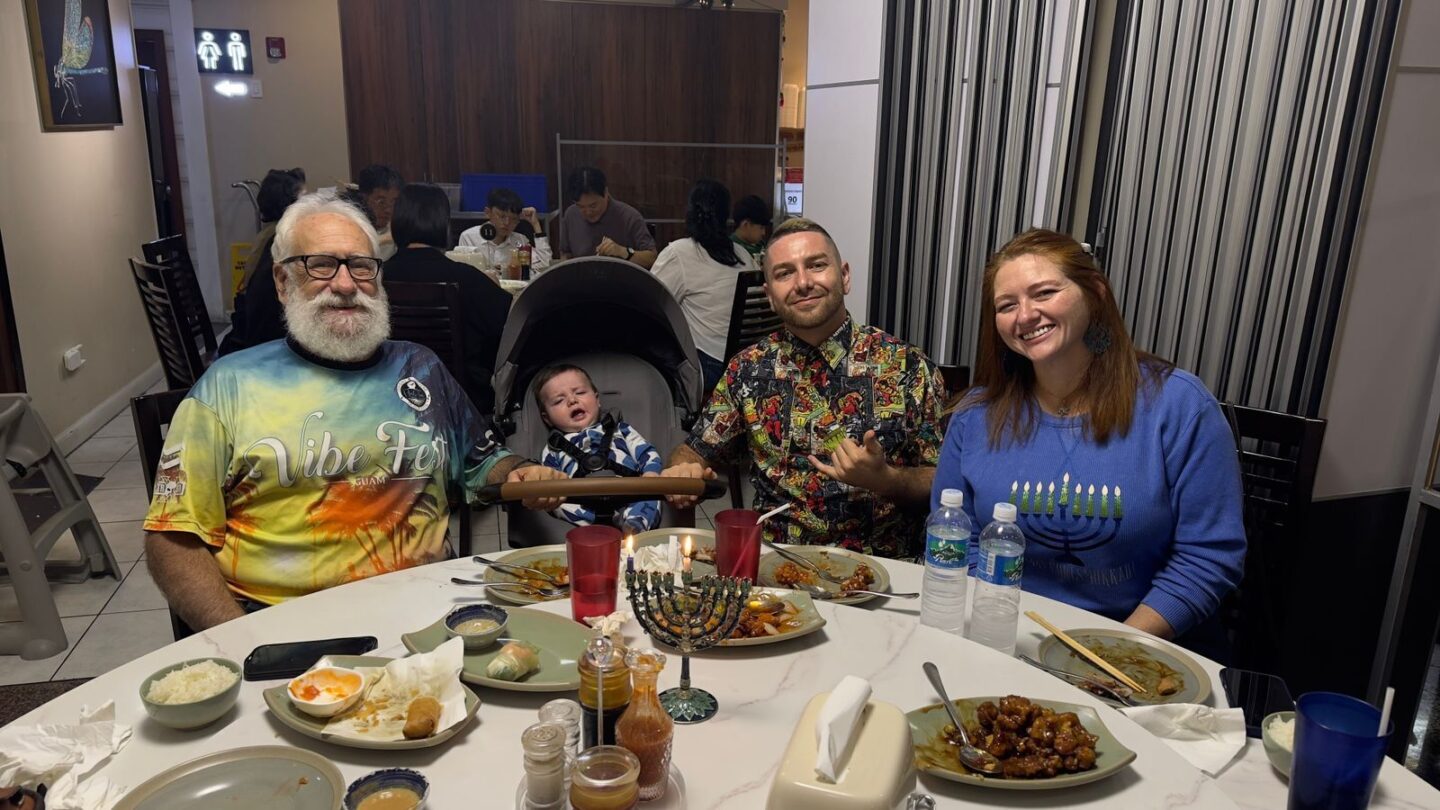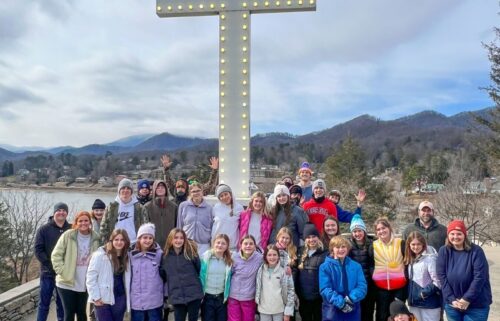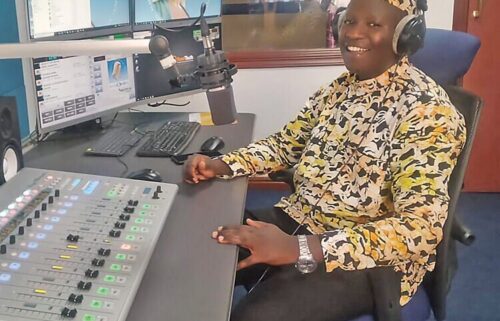Hanukkah on Guam: Celebrating light, faith, and community

By Julianne Hernandez Pacific Daily News
Though Catholicism is the dominant faith on Guam, the island is home to a diverse range of religious communities, reflecting its multicultural population. This year, one of those communities — Judaism — saw its celebration of Hanukkah coincide with Christmas.
Guam’s Jewish community may be small, but it has played an important role in the island’s cultural and even economic fabric for many years. While the island lacks a formal synagogue, Jewish residents have found creative ways to preserve their traditions, especially during holidays like Hanukkah.
Hanukkah, also known as Chanukah or the Festival of Lights, commemorates the rededication of the Second Temple in Jerusalem. Celebrated in 18 to 20 countries worldwide, it holds deep spiritual significance for Jews. While Rosh Hashanah and Yom Kippur—the Jewish New Year and Day of Atonement—are considered the most sacred holidays, Hanukkah is widely cherished. The holiday is marked by nightly menorah lightings, special prayers, games of dreidel, and traditional foods. This year, the first day of Hanukkah coincided with Christmas, and the celebration will continue through Jan. 2.
They also have a rabbi fly out to Guam to help them celebrate the major holidays. This year, it will be Rabbi Eitan.
Among the Jewish residents on Guam is Ben Schiff, CEO of AlterXego and a well-known figure in both the island’s business and community scenes. Schiff has long been committed to philanthropy, driven by a deep connection to his Jewish faith.
“Being Jewish is a huge part of my whole life,” Schiff said. “There’s a concept in our faith called Sadaqah, which means to give back, and charity work has been ingrained in me growing up. So doing all that nonprofit work with the Guam Selfie Museum and everything else is actually just part of our religion—giving back to the community and helping people who are less fortunate or in need.”
Schiff’s faith has also guided his efforts during times of crisis. He recalled how AlterXego supported the community during the pandemic and after Typhoon Mawar.
“We were giving free ice for people with insulin and other medical needs. Giving back to the island that I grew up in has always been ingrained in me, and my faith makes that feel even more meaningful,” Schiff said.
Having moved to Guam at an early age, Schiff noted how the school dynamics differed from what he was accustomed to on the mainland.
“I moved here when I was nine or 10, and I went to Agueda [Middle], GW [High], JFK [High], and UOG. In the states, I went to a Hebrew day school, where half the day was Hebrew classes and the other half was English classes like math and science,” he recalled. “Then I came to Guam in my last year of middle school, and it was a little different, not having the half-day Hebrew classes where you learn about the Torah, the language, and how to read and write in Hebrew, and then transitioning to a full American public school curriculum.”
Despite limited access to Jewish resources, Schiff quickly embraced the island’s welcoming atmosphere.
“To be honest, the people of Guam are so hospitable that when I came here, I fell in love with it instantly,” he said. “I just wanted to make Guam my home forever.”
Creating space
Schiff also discussed the challenge of maintaining a Jewish presence on an island without a formal synagogue. To address this, the local Jewish community has worked to create spaces for worship and fellowship.
“We’re working on creating Temple Shalom, the first off-base synagogue on Guam. The only synagogue on the island is on base, and since 9/11, it’s been difficult—if not impossible—for most of us to access it,” Schiff explained. “So, we’ve hosted Jewish ceremonies at other venues, and we’ve been working toward building our own synagogue. We also raised funds to acquire a Torah, which was a big milestone for us.”
The Torah, a central element of Jewish worship, arrived on Guam in 2022 after a significant fundraising effort. Schiff detailed the process of acquiring the Torah.
“We raised around $5,000, and the Jewish community off-island matched the donation. Torahs are handwritten, and if there’s even a small mistake, the entire Torah must be discarded and redone. So it’s a significant investment of time and money.”
Celebration of light
The timing of Hanukkah, which follows the Jewish lunar calendar, occasionally aligns with Christmas. Schiff noted the special significance of this overlap, emphasizing shared values of light, hope, and togetherness.
“Hanukkah is technically the Festival of Lights, and since Christmas was on the same day this year, we saw all the lights around the island—from Skinner Plaza to Triangle Park to Ypao. It was nice to see everyone, even on Christmas, enjoying the lights,” he said. “That’s what Hanukkah is all about, and I thought it was really cool how both religions celebrate in a similar way.”
For Schiff, the food is also a central part of the celebration. After COVID-19 restrictions affected gatherings, he’s excited to return to holiday traditions.
“During COVID, food was a little more concerning with people sharing. Now, the Jewish community is looking forward to sharing latkes and sufganiyot,” Schiff said. Latkes are potato pancakes, typically eaten with applesauce or sour cream, while sufganiyot are jelly-filled doughnuts.
“We’re excited to get together and share the traditional foods we grew up with and not have to worry about the same health concerns as before.”
He also reflected on the diversity of the Jewish community on Guam, which is often overlooked.
“The most surprising thing is that many people on Guam don’t even realize there’s a Jewish community here,” Schiff said. “There are Jews who own businesses, are active in the community, and contribute to the island in many ways. Sometimes, I’m still the first Jewish person people meet. Jews come from all different ethnic backgrounds, so you may not recognize someone as Jewish just by looking at them.”
Schiff mentioned several prominent members of the Jewish community, including his father, Joel Joseph, who runs Wise Owl Animal Hospital, and Tom Dent, a key figure in the local Jewish group. He also highlighted Bart Jackson, a former restaurant owner now with Three Squares, and Hank, a magician and food entrepreneur in the tourism industry.
“The Jewish community here is really part of Guam’s melting pot,” Schiff said. “We’re involved in various aspects of life on the island. It’s amazing how diverse and active we are, and it’s great to see how much people from different backgrounds contribute to this community.”
Misconceptions
As one of the most visible members of the Jewish community on Guam, Schiff feels a responsibility to educate others and address misconceptions about his faith.
“Honestly, I’m honored to be the one people turn to when they want to learn about the Jewish community,” Schiff said. “It’s important for people to meet someone in person, talk with them, and learn about their faith. It helps break down misconceptions, and I always want to promote inclusivity. Our faith is about accepting all people.”
Schiff acknowledged the rise in tensions between different faiths, especially with recent conflicts involving Palestinian and Jewish communities. He shared his experience with local boycotts of his business due to his Jewish faith.
“If I’m being honest, I’ve even had local companies say to boycott AlterXego, to boycott the Guam Selfie Museum, to boycott the Altaverse, simply because of my faith. And of course, that kind of hurts,” Schiff said. “We’re trying to do something good for the community, and they’re turning my faith against us.”
Despite this setback, he remains committed to helping the island in any way he can.
“That’s kind of always like God testing you in the Jewish religion. All faiths are welcome. Everybody inside Israel is allowed to worship any person and any god they want. All life is sacred in the Jewish faith,” he said. “No matter the ethnic background or race, that’s always what I wanted to promote on Guam because we are a melting pot.”
Schiff emphasized that Jews are “very open-minded and accepting of everyone.” He added, “When it comes to war and everything, it’s about accepting someone else’s religion, even if it doesn’t align with yours. It’s never okay to take anyone’s life for their beliefs.”
For Schiff, Hanukkah is a time for celebrating miracles—both big and small.
“Hanukkah is a time of miracles,” Schiff said. “I believe it’s even more relevant now because I think there are a lot of miracles happening that we may overlook. Even if they aren’t as significant as the original miracle of Hanukkah, to me, it’s still a time of miracles where a little bit of faith goes a long way.”
This year, the miracle for Schiff is simply being able to celebrate with his family.
“Just being with my family, celebrating the holidays, is a miracle,” he said. “There are so many people in the world who can’t be with their families right now. Some are still held hostage or in prisons. It’s a reminder to appreciate the small things in life.”
Schiff also reflected on how fatherhood has deepened his faith.
“Having my son has reinspired me to dig deeper into my faith,” he said. “Of course, he’s going to grow up with whatever faith he chooses. We accept all faiths and religions. That’s what we’re about.”
Celebrating on island
K’tanaw Hirsch, Schiff’s older sister and an administrator at Wise Owl Animal Hospital, is another active member of Guam’s Jewish community. She spoke about how Hanukkah is celebrated on the island and the unique way the community shares its traditions.
“Hanukkah isn’t one of the high holy days in Judaism, but it’s probably the most well-recognized holiday outside of Judaism, just because it’s so close to Christmas,” Hirsch said.
Having grown up practicing Judaism in the U.S., Hirsch returned to Guam permanently this year after years of traveling back and forth. She expressed her appreciation for the island’s welcoming and inclusive environment, especially when it comes to sharing traditions and learning from one another.
“Guam’s always been a very welcoming community in general,” she said. “People approach anything new with a sense of wonderment and awe, not so much judgment.”
Hirsch spoke about how the local Jewish community celebrates Hanukkah. Though the community is small, they come together for traditional activities like lighting the menorah, playing dreidel, and enjoying food like latkes and sufganiyot.
“We get together, either in large groups or just as families,” Hirsch explained. “The main thing is lighting the menorah, and sometimes we’ll play dreidel or eat the traditional foods.”
The overlap of Hanukkah and Christmas this year made the celebration even more special for Hirsch.
“It’s a nice reminder of what’s truly important in life—joy, family, and community,” she said. “Any holiday that brings people together like that is significant.”
Hirsch also highlighted the spirit of resourcefulness among the Jewish community on Guam. Since supplies like menorahs and candles can be hard to come by, members often share these items with each other.
“We’re very good with communicating,” she said. “We ask, ‘Who has Hanukkah candles? Who has an extra menorah?’ We all share, and everyone gets what they need.”
While political tensions surrounding the Middle East can complicate her identity, Hirsch expressed pride in the way Hanukkah fosters unity among diverse faiths.
“Hanukkah is about remembering the rededication of our temple, after not being able to practice our religion openly,” Hirsch said. “It’s about coming together as a community.”
Hirsch remains optimistic about the future and how celebrations like Hanukkah can bring people together.
“I think it’s very fitting that Christmas and Hanukkah fell on the same day this year,” Hirsch said. “Any celebration that brings people together to find light is significant.”
For those wanting to connect with the Jewish community on Guam, Hirsch recommended the Guam Jewish Community Facebook group.
“We’re here, and even if you’re not Jewish, if you’re interested in learning about it, we welcome everyone,” she said.


